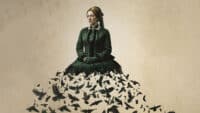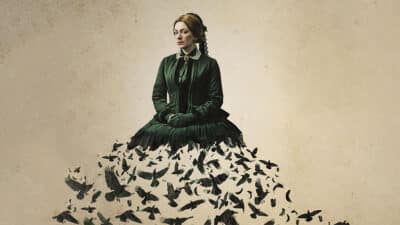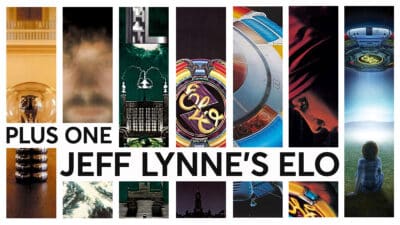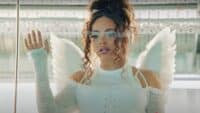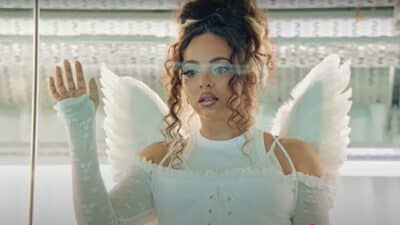Interview
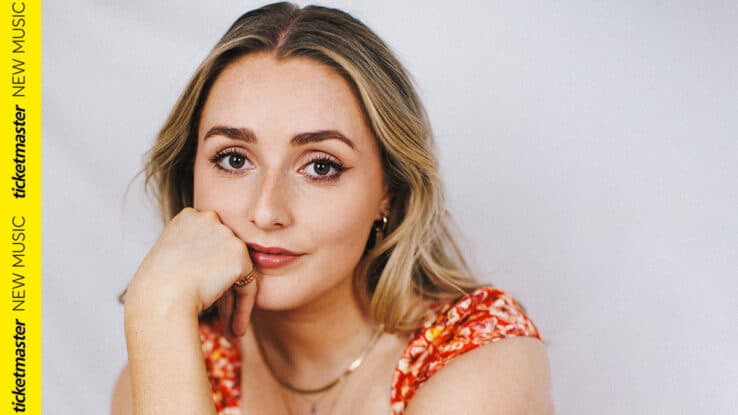
Interview
Áine Deane: “A win for one woman is a win for all of us”
The singer-songwriter talks about the mid-twenties crisis that inspired her latest EP
An English lit and drama student during lockdown, Áine Deane found a vital outlet in TikTok. Over 274.000 followers and three EPs later, she’s getting ready for her first headline tour, a fact she mentions with an irrepressible sense of anticipation written across her face.
The endearing, unabashed optimism, the humorous self-deprecation and honest acknowledgement are familiar traits of a songwriter who resonates so deeply online and, even more importantly, live. Whether that’s on an intimate bookstore tour or supporting Sam Smith at the Royal Albert Hall: in her pop diary entries her achingly confessional lyrics, guitar-inflected heartbreaks and growing pains go hand in hand with infectious, singalong choruses. Written over the course of a year, TALES OF A TWENTY SOMETHING came in September 2024 to seal a time of thrilling yet chaotic change. “‘The One Before The One’ was hard to write because it was quite an emotional and fresh topic and I’m not very good at writing songs about myself,” she admits, praising the safe space created by her team of friends and collaborators in that endless quest for a great pop song. Here, she delves into the art of storytelling, the often unglamorous life of an independent artist, and why it’s important to always put on your best show, whether “there’s an audience of 20 or an audience of 200”.
You started posting videos online during the pandemic. Was that the point where you thought your music couldn’t take the backseat any longer?
I have always played instruments and written music and done musical theatre. I never had any intention of making this a career. It’s not really an option that’s presented to you at school, is it? But I started posting videos on TikTok in the pandemic mainly because I was used to doing musical theatre rehearsals five to seven nights a week alongside my theatre degree, and those rehearsals stopped because obviously, you couldn’t be in the same room as anybody. So I needed a creative outlet.
I started posting bits before TikTok was huge – which I think is the only reason they did well. If I’d tried to start now I’d struggle. But I saw that there were people who were interested in hearing what I had to say. At the same time, I was applying for marketing and HR grad schemes for lots of different companies and finishing my dissertation. So it wasn’t like a conscious decision of “Oh, I must now follow my dreams”. Very very luckily I found myself in the position where there was a captive audience that wanted to hear me.
How do you navigate that emotional space where you release your bedroom melodies into the world? Is there any difference between then and now?
I think I’m slightly more selective about what I share now in terms of the music I write. In uni, I was also in lectures every day and living with five other wonderful girls and life was so busy. I would usually just write something and immediately post it, and that was the way of working when I was starting out. Now I write music every day, with lots of lovely writers and producers and other artists. And so I often don’t share the songs until I know they’re coming out and they’re basically done. So, yeah, I’m more selective about how much I share – but not the content. I still share personal and vulnerable stuff, maybe more now. It’s terrifying but I’ve never been too worried about that cause I know I’m speaking the truth with all of my music.
@ainedeane whoopsie !! wrote a problematic song again !! silly me !! #originalsong #songwriter #toxic #problematic #ifyoucalledmetodayiwouldcomebacktomorrow #ifyoucalledmetoday #voiceeffects ♬ original sound – áine
How do you deal with negativity online?
I’m lucky that I don’t get loads. That’s not an invitation for people to give any more, but I look at my comments non-stop: if you have anything negative to say, I will see it, I will delete it, I will block you. There’s no space for negativity. You post things to the internet, people have the freedom to tell you what they think about it, but you have the autonomy to remove it from your profile. I’m just a big fan of “don’t pay attention”.
Most of the time it’s a faceless profile, someone hiding behind the keyboard and probably trying to make themselves feel better. It’s rarely a reflection on yourself. I always think if they saw me in the street they’d never come up to me and say it to my face so I don’t need that on social media. Although, I will say, the first video of mine that ever went viral – I genuinely think it was because my eyebrows were awful. About half the comments were of people saying “Her eyebrows are so thick!” I had done them really badly that day. I agree, they were terrible, so I haven’t deleted any of those comments. I’m like, fair play!
You mentioned writing with other people now. What’s that process like?
When I’m writing on my own I write quicker because I’m writing exactly what I think, I’m not running it by anybody. When you’re writing with other people, you say a line and then everyone is trying to improve that. You might go through seven versions of that line. And I think that’s really beneficial, especially with songs where you have the concept, or you might have the chorus but you know it can be better. So I personally love collaborating because I think it’s a really good way of making sure that you’re not too focused on, like, the one point. The reason that I wanna write a song might not resonate with everybody else but it might be a good starting point. I think I write quite personal, sort of niche lyrics and marrying that with other songwriters who are very good at writing universal, broad statements… Those two together I think makes for a great pop song.
You’re very open about life as an independent artist, you don’t glamorise it.
I work in social media management Monday to Friday, and then I teach musical theatre on the weekends as well. I’m so lucky to have such lovely jobs, lovely colleagues, flexible work. It’s impossible to be an independent artist if you don’t have other streams of income. Especially in London. And there’s no point in glamorising it because I want to share the journey with fans and when we get to the point, hopefully, where I am doing music full-time and it’s paying for itself, then that’s something to really celebrate. That way everyone’s more invested in the journey, and it’s nice to shed a light. I think a lot of people don’t realise how expensive it is to put a song out or to go on tour. It costs so much! Everyone can benefit from being more educated in every field.
Would you like to tell us more about that “mid-twenties crisis” that inspired your latest EP?
I went from school straight to uni, and then you leave uni and you’re like “What do I do now?” You’re out of an institution and it’s very easy to go from GCSEs to A levels to uni and someone telling you what to do the whole time. And I pursued a career that probably is not very stable, moved to London and all my friends moved to London and it was utter chaos! You go through break-ups and you have exes that are getting married and the girls are all sort of moving to different parts of the world and my friends don’t work in the music industry – I have friends who are lawyers, accountants, my housemate works in finance.
Everyone’s doing different things at different times and making awful mistakes, always. I really wanted to encapsulate that in a project. There’s a song about my relationship with my mum, which I’ve really found to be blossoming from my early 20s – probably cause I stopped being an annoying teenager. There’s probably about 200 songs that were written for this project that will never see the light of day. But every song to me is like a little diary entry and I’ve just picked out the ones that I feel are the best, but also what people will relate to, hopefully.
You have a great love of books. In what ways do you see them influencing your songwriting?
I’m such a bookworm! I’m literally staring at my bookshelf, it’s overrun and I’ve got piles of books on the floor. There is a time and a place for songs that have more of a fictional twist and I’ll always take influence. I’m always inspired by the different relationships navigated in those books. If you looked at what I was writing across the year and then looked at what I was reading at the time you could definitely see the influences. But, for now, I think that I will always write very truthful music just because it’s what comes to me naturally and what I relate to the most.
You mentioned writing a song about your mum, ‘1/4’. ‘The Sisterhood’ is about your friends having your back. How have these strong female relationships impacted you?
My mum is one of the most important, if not the most important woman in my life. I can call her and she will pick up no matter what she’s doing – I might be having a breakdown or I might just not know how to roast a chicken. Nothing is off-limits. And I’ve carried with me different friends from each part of my life. My best friend, who I live with, I’ve known her since I was two. To have those people in your life who are constantly championing you is the most amazing feeling. In any industry, it’s really rough, especially as you’re working your way up. But I think in music, you’re not going into an office and seeing all your colleagues every day and you don’t have a boss and there’s no salary coming in at the end of every month. It’s quite a lonely industry to be in, especially as a solo artist.
On the other hand, you’ve said that not enough girls are supporting girls in this industry…
Watching the music industry as I was growing up, you often didn’t see too many artists being outspoken about other artists and really championing them. Obviously, you are competing with your peers no matter what way you wanna frame it. But what I think is so lovely about the up-and-comers of 2024 is that you’re seeing so many people support other artists – and especially girls. I’ve got lots of females supporting me on my upcoming tour, and I just organised a show called “The Sisterhood Show” in London, where I had eight or nine amazing female artists come and sing with me. Traditionally, it has been a very male-dominated industry and there are some amazing male artists out there. But it’s time for the girls to rise up. You see it with Taylor Swift and RAYE and Maisie Peters and Holly Humberstone, they’re all exploding. It might be a competitive industry but a win for one woman is a win for all of us.
On ‘The Sisterhood’, there’s also a bit of a country influence.
I’m a huge country music fan. My older brother loves listening to Luke Combs and that’s how I started finding my feet in the country world. I’m never gonna sound like a country singer, I’m as British as they come, but the production in country music is so organic, it feels like you could walk into a room and hear a band play. When I’m working on the production of my songs I’m heavily influenced by people like Kelsea Ballerini and, a bit more folky, but Noah Khan and Avery Anna. The very core of country music is storytelling lyrics and that’s what I love. It’s slightly different from what I do because it’s sung in a very southern accent and there are lots of references that I wouldn’t make. But I think my music sits somewhere, weirdly, in the middle of pop and folk: a bit country and a bit singer-songwriter. Kind of an amalgamation of all that.
It’s your first headline tour. What are you most looking forward to and what do you find most terrifying?
I’m most looking forward to meeting all the people who listen to my music and hearing them sing the words back to me. That will never get old! I remember the first time I heard people sing my lyrics back to me and I was like, “This is ridiculous! Why are people singing something that I wrote in my bedroom and voice-noted to my best friends?”. And I’m always terrified right before I go on stage that it’s just gonna go badly, something’s gonna break, people are not gonna be there. Which has never happened.
So you’ve never played, say, to a room of three?
I definitely played to rooms of 20. There are venues across the country that I very clearly remember playing and there being my family and very few others in the audience. But I think that’s so necessary because it teaches you how to try and hold a crowd because if there are only 20 people in the audience, they’ll be chatting, it’s a lot easier to lose them. It’s exceptionally humbling, but it’s good experience, you know. You’ve gotta play to empty rooms!
Áine Deane plays Dublin, Glasgow, Manchester and London this October. Find tickets here





